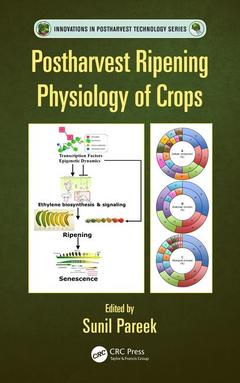Postharvest Ripening Physiology of Crops Innovations in Postharvest Technology Series
Coordonnateur : Pareek Sunil

Postharvest Ripening Physiology of Crops is a comprehensive interdisciplinary reference source for the various aspects of fruit ripening and postharvest behavior. It focuses on the postharvest physiology, biochemistry, and molecular biology of ripening and provides an overview of fruits and vegetables, including chapters on the postharvest quality of ornamental plants and molecular biology of flower senescence.
It describes various developments that have taken place in the last decade with respect to identifying and altering the function of ripening-related genes. Taking clues from studies in grape and tomato as model fruits, the book reviews a few case studies and gives you a detailed account of molecular regulation of fruit ripening, and signal transduction and internal atmospheres in relation to fruit ripening. It also presents an overview of methods utilized in fruit proteomics, as well as a global proteome and systems biology analysis of fruits during ripening, and discusses the basics of dormancy, its molecular and physiological basis, and methods to break the dormancy.
The book provides an overview of the most important metabolic pathways and genes that control volatile biosynthesis in model fruits, including tropical, subtropical, and temperate fruits, with a special emphasis on fruit ripening and the role of ethylene during this process. It presents a brief description of the composition of volatiles in various fruit species and addresses the influences of preharvest factors and postharvest technologies on fruit aroma, basic mechanisms responsible for postharvest flavor change in fresh produce, and the potential impacts of various postharvest technologies on flavor.
Ripening Physiology: An Overview. Postharvest Physiology of Fruits and Vegetables. Postharvest Quality of Ornamental Plants. Physiology and Molecular Biology of Flower Senescence. Respiratory Metabolism. Stomata and Postharvest Physiology. Water Loss from Harvested Horticultural Commodities. Lysophospholipids and Postharvest Quality of Fruits, Vegetables, and Cut Flowers. Fruit Skin Color and the Role of Pigments during Fruit Ripening. Molecular Regulation of Fruit Ripening. Advances in Ethylene Signal Transduction in Fruits and Vegetables. Internal Atmosphere of Fruits: Role and Significance in Ripening and Storability. Proteomics of Fruit Development and Ripening. Potato Tuber Dormancy and Postharvest Sprout Control. Calcium Deficiency Disorders in Plants. Fresh Fruit Aroma: An Integrative Overview for a Complex Flavor Trait. Flavor and Aroma Compounds of Some Exotic Tropical Fruits and Berries: Biosynthetic Pathways and Metabolism. Impact of Postharvest Technologies on the Flavor of Fresh Fruits and Vegetables.
Dr. Sunil Pareek obtained his PhD in Horticulture (PHT) from Rajasthan Agricultural University, Bikaner, India. He is an Associate Professor (PHT) in the Department of Agriculture and Environmental Sciences, National Institute of Food Technology Entrepreneurship and Management (NIFTEM), Kundli, India. Dr. Pareek is principal or co-principal investigator on several fruit, tuber crop, processed products, and integrated farming projects. He has published extensively and is the recipient of the University Outstanding Services Award 2014, Outstanding Team Research Award 2014, Young Scientist Award 2012, HS Mehta Young Scientist Award 2012, JISL Fellowship 2014, and the Fellow Award of the Confederation of Horticultural Associations of India.
Date de parution : 09-2016
15.6x23.4 cm
Thèmes de Postharvest Ripening Physiology of Crops :
Mots-clés :
Japanese Morning Glory; Nonclimacteric Fruit; Postharvest; Climacteric Fruit; Ripening; Cut Owers; Physiology; Vase Life; Fruit; Acc Synthase; Ethylene; Ethylene Production; Respiration; Ower Senescence; Lysophospholipids; Ethylene Receptors; Aromatic compounds; Ethylene Signaling Components; Petal Wilting; Mad Box Gene; Tomato Fruit; Aroma Volatiles; ACO; Tuber Dormancy; Deciency Disorders; Petal Senescence; Fruit Ca2; Exotic Tropical Fruits; Stomatal Density; Root Ca2; Sprout Growth; Subfamily Ii; Eukaryotic Translation Initiation Factor 5A



